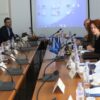European Movement in Albania (EMA) in cooperation with the Ministry of Agriculture and Rural Development and in partnership with the Slovak Foreign Policy Association, with the financial support of SlovakAid held on April 28, 2021 Session 3 of Working Group III on “Common European Agricultural Policy (CAP) – innovations and challenges”.
Gledis Gjipali, the executive director of EMA welcomed the participants and highlighted the relevance of these activities in the European Integration process and in the overall development of the country. He stated that these sessions aim to inform and share experiences between local actors and foreign experts.
Florian Xhafa spoke about rural development in Albania and IPARD programme as part of IPA project. This is an essential instrument to make Albania and rural development as a whole, competitive not only within the region but also with the European market. This initiative has several conditions that applicants must meet to apply. The first condition has to do with the ownership of the agriculture land and the second one is related to farmer’s abilities to conduct a business plan and a qualitative application. The grants through IPARD programme are ex-post. An applicant needs to conduct the investment and later on will receive the reimbursement.
Jan Barsvary, Slovak expert on agriculture policies started his presentation by explaining the two main pillars of CAP structure. The first pillar has to do with direct payments for farmers and is financed by European Agricultural Guarantee Fund. The second one is about rural development policies and aims to achieve stability in agriculture. Moreover, Barsvary talked about the legislative requirements for basic benefits under the first pillar. In his presentation, he also explained the CAP 2023-2027 reform and new regulations on strategic plans, market organization and most recently CAP financing and management. With regards to the future of CAP he said that there are 9 objectives for both pillars. Barsvary provided examples from Slovakia’s case and explained how they relate to intervention strategies. Furthermore, the Slovak expert provided information on the measures taken by the EU during the Covid-19 pandemic period in the agricultural sector. Temporary programs were designed with the state financial assistance. Several specific “green-lines” were created to allow the transport of livestock across borders. The state increased direct payments and those for rural development. During this period major exceptions were made to EU’s general market rules. He also spoke about the measures taken by Slovakia at the national level and the results of the CAP. This program has brought farmers more stability and a guaranteed source of income. On the other hand, the full potential of CAP was not fulfilled because the contribution from the state was very low. Barsvary gave some concrete recommendations for Albania. He emphasized that the country should not hesitate to negotiate with the European Commission to protect national interests. Also, the CAP program for agriculture is insufficient and that the state should prioritize investment in this sector and modernize the food processing industry.
Agim Rrapaj chairman of KASH stated that if we consider the requirements for the application procedure most of the Albanian farmers do not have a land ownership certificate. Informality in our country is about 83% and affects negatively the absorption of funds. Rrapaj also spoke about the shortcomings of the current legislation regarding the agricultural sector and the lack of insurance. He pointed out that recently even in the most productive areas there has been a significant decline in livestock production of milk and meat.
Lauresha Grezda, Director at the Ministry of Agriculture and Rural Development thanked the experts and participants, emphasizing the importance of their involvement and cooperation of stakeholders in drafting legislation in Albania. Grezda emphasized the relevance of lobbying by state representatives in Brussels and the group that is expected to be sent from Albania. Finally, she expressed the Ministry’s willingness to support similar initiatives.
Discussions were raised on the topic of concrete projects that can be conducted in Albania and the role of women in agriculture. Detailed information was also provided on the lobbying process carried out by the structures assisting farmers in the European Parliament.




















